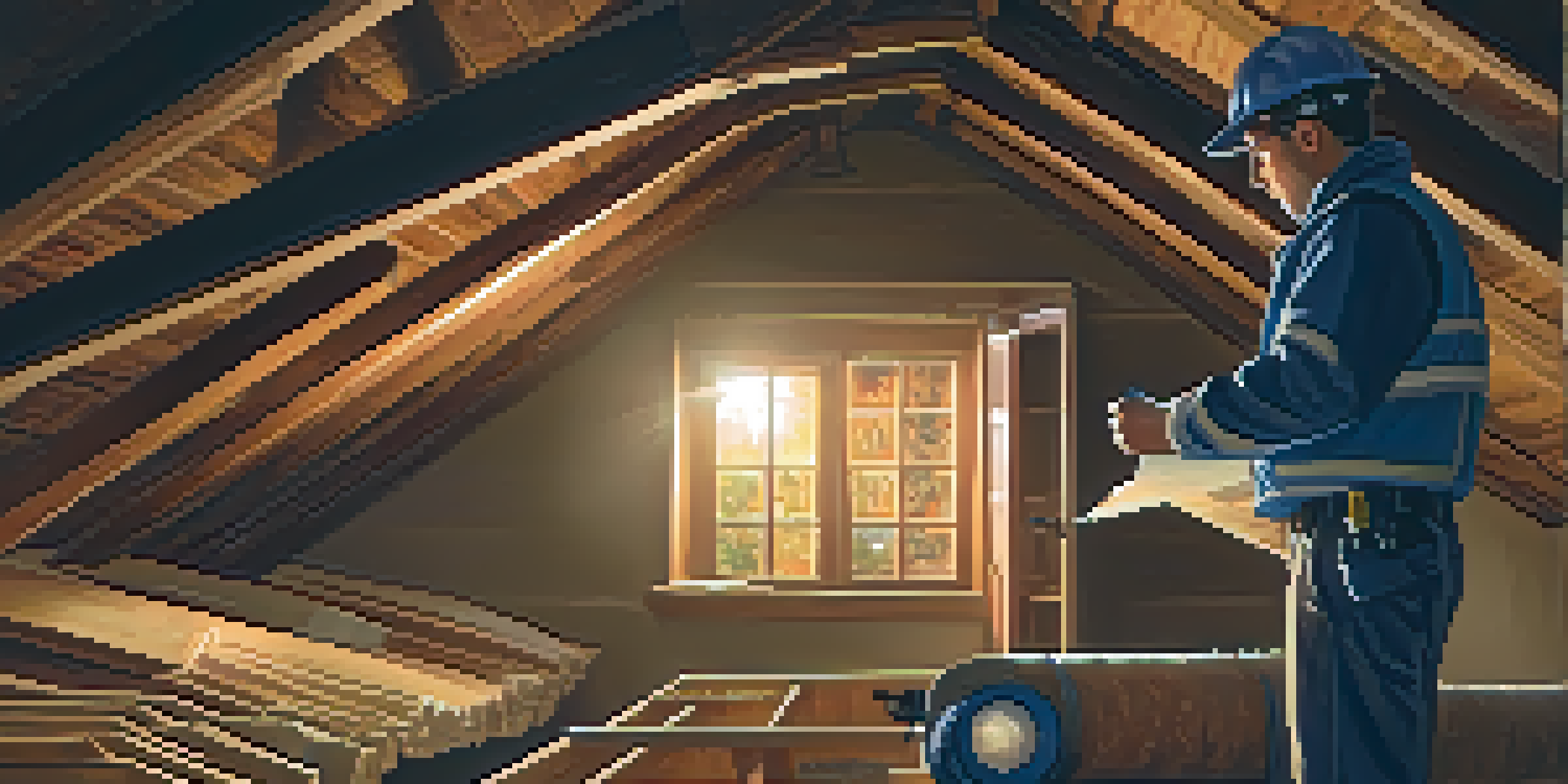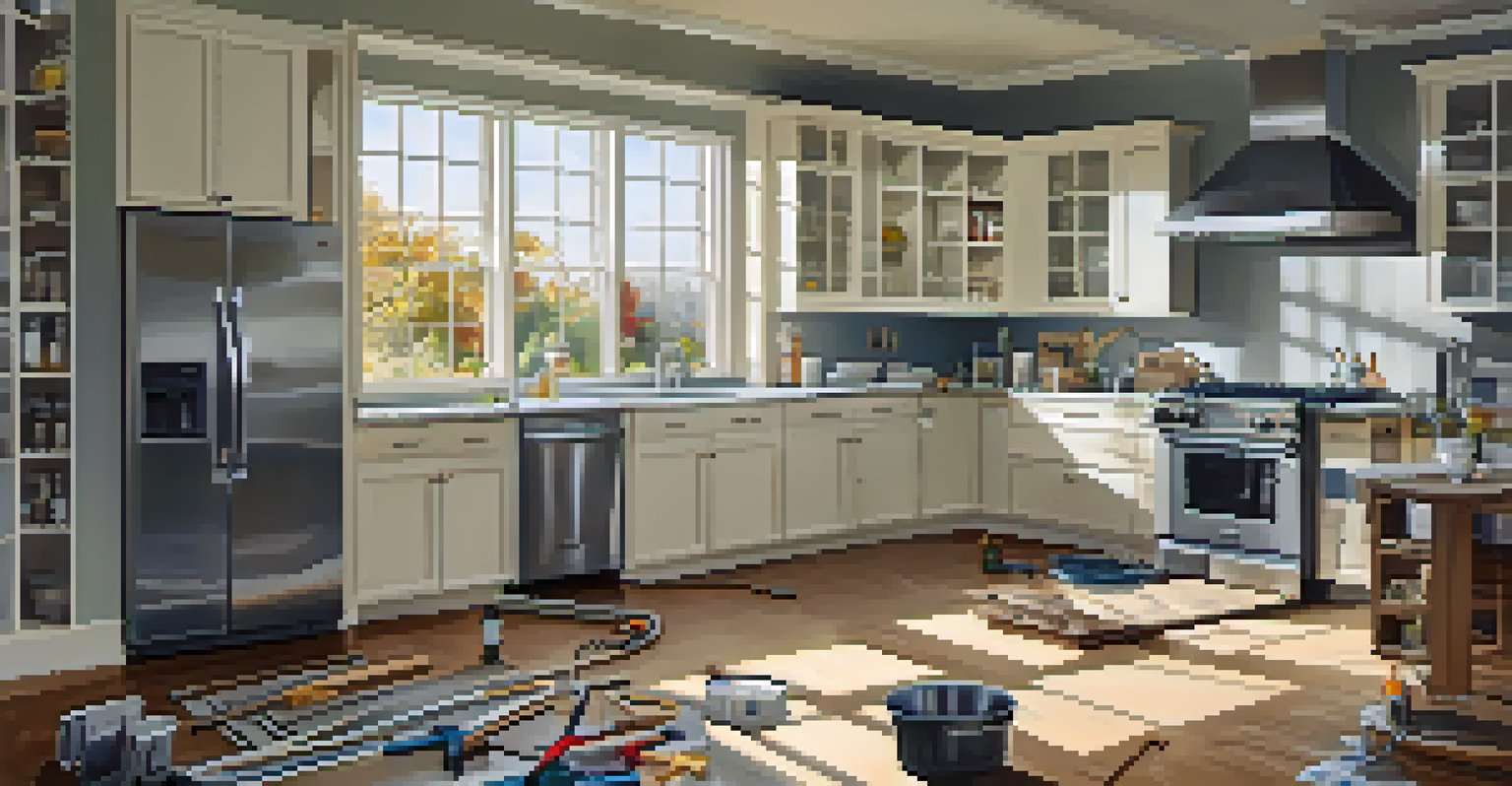The Role of Home Inspections in Fire Safety During Renovations

Why Home Inspections Matter for Fire Safety
Home inspections play a critical role in maintaining fire safety standards, especially during renovations. They help identify potential hazards that could increase the risk of fire, such as outdated wiring or flammable materials. By catching these issues early, homeowners can take necessary action to mitigate risks before they escalate.
An ounce of prevention is worth a pound of cure.
Furthermore, inspections provide peace of mind, ensuring that renovations comply with local building codes and fire safety regulations. When a qualified inspector assesses your home, they can help you understand the specific requirements that apply to your property. This knowledge not only protects your investment but also ensures the safety of your family and neighbors.
Ultimately, proactive home inspections can save lives and property. By prioritizing fire safety during renovations, homeowners can create a safer living environment, reducing the likelihood of accidents and costly damages in the future.
Common Fire Hazards Found During Renovations
When renovating a home, several fire hazards may lurk beneath the surface. Common issues include faulty electrical systems, improperly installed heating equipment, and the presence of combustible materials near heat sources. Identifying these hazards early on is essential for preventing potential disasters.

For instance, if a renovation involves updating the kitchen, it’s crucial to ensure that gas lines are properly installed and that any electrical work meets safety standards. Neglecting these aspects can lead to dangerous situations, including gas leaks or electrical fires. Conducting a thorough inspection can help uncover these risks.
Home Inspections Enhance Fire Safety
Proactive home inspections identify potential fire hazards, ensuring a safer environment during renovations.
Additionally, renovations often involve a mix of old and new materials. A home inspector can evaluate whether these materials are compatible and safe to use together. This assessment helps prevent situations where older materials may not withstand modern heating and electrical demands, ultimately safeguarding your home.
The Importance of Qualified Inspectors
Hiring a qualified home inspector is paramount when it comes to fire safety during renovations. These professionals have the training and experience to identify potential hazards that may go unnoticed by an untrained eye. Their expertise ensures that all aspects of your home are thoroughly evaluated.
Safety isn't just a gadget, it's a state of mind.
A reputable inspector will not only check the obvious areas but also delve into the hidden components, such as behind walls and within attics. This comprehensive approach allows for a complete risk assessment, covering everything from structural integrity to fire safety compliance. The insights gained from their assessment can guide your renovation decisions.
Moreover, working with qualified inspectors can help streamline the renovation process. They can provide recommendations on how to address any found issues, ensuring that your project stays on track and within budget while prioritizing safety. In the long run, investing in a qualified inspector can save time, money, and, most importantly, lives.
Understanding Local Fire Safety Regulations
Every locality has specific fire safety regulations that must be adhered to during renovations. Familiarizing yourself with these regulations is crucial to ensure compliance and avoid potential fines or delays. This is where home inspections come into play, as they often include a review of local codes.
Local regulations may dictate aspects such as the types of materials that can be used, the installation of smoke detectors, and the placement of exits. By understanding these rules, homeowners can ensure that their renovations align with safety expectations, ultimately protecting their investment and their loved ones.
Qualified Inspectors Ensure Compliance
Hiring qualified inspectors guarantees thorough assessments, helping homeowners meet local fire safety regulations.
Additionally, local fire departments may offer resources or consultations regarding fire safety during renovations. Engaging with these resources can enhance your understanding of the requirements and further emphasize the importance of thorough inspections.
How to Prepare for a Home Inspection
Preparing for a home inspection is a straightforward process that can significantly enhance the inspection experience. Start by ensuring that all areas of your home are accessible, including attics, basements, and crawl spaces. This accessibility allows inspectors to perform a thorough evaluation without unnecessary delays.
Next, gather any relevant documents related to past inspections, renovations, or repairs. Providing an inspector with this information can help them understand the history of your home and identify any recurring issues. A well-informed inspector can offer more tailored advice and recommendations.
Finally, consider being present during the inspection. This allows you to ask questions and gain insights into the findings as they arise. Engaging in this process can empower you to make informed decisions about your renovations while prioritizing fire safety.
Addressing Inspection Findings: Next Steps
After the home inspection, you'll receive a detailed report outlining any identified issues related to fire safety and other concerns. It's essential to address these findings promptly, as neglecting them can lead to increased risks during and after renovations. Prioritizing the most critical issues first is a practical approach.
For example, if the inspector flags outdated wiring, consider hiring a licensed electrician to make necessary upgrades before proceeding with other renovation aspects. Ensuring that all safety-related findings are resolved not only protects your home but also contributes to a smoother renovation process.
Address Findings for Long-Term Safety
Timely resolution of inspection findings reduces fire risks and can enhance your home's value and safety features.
Additionally, keep in mind that some fire safety improvements may qualify for local grants or incentives. Researching available resources can help offset renovation costs while enhancing your home's safety features. Taking proactive steps in response to inspection findings can lead to a safer and more valuable home.
The Long-Term Benefits of Fire Safety Inspections
Investing in fire safety inspections during renovations offers numerous long-term benefits for homeowners. Firstly, it significantly reduces the risk of fire-related accidents, protecting both property and lives. A safe home not only instills peace of mind but also enhances the overall quality of life for residents.
Furthermore, a home with verified fire safety measures may have a higher resale value. Potential buyers often prioritize safety features, making your property more appealing in the competitive real estate market. This added value can translate into a better return on your initial investment.

Lastly, regular inspections and adherence to fire safety standards foster a culture of safety within your home. By prioritizing safety, you create an environment where family members are educated about fire risks and prevention, ultimately contributing to a safer community.